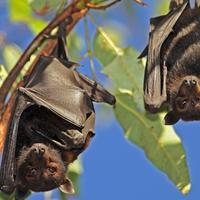Bats and Viruses – level 2
Летучие мыши|||
Dơi||Virus|
||Viren|
박쥐||바이러스|
蝙蝠||病毒|
Летючі миші|||
Netopirji||Virusi|
コウモリ||ウイルス|
Fledermäuse und Viren - Stufe 2
Murciélagos y virus - nivel 2
Chauves-souris et virus - niveau 2
Pipistrelli e virus - livello 2
コウモリとウイルス–レベル2
박쥐와 바이러스 - 레벨 2
Vleermuizen en virussen - niveau 2
Nietoperze i wirusy - poziom 2
Morcegos e vírus - nível 2
Летучие мыши и вирусы — уровень 2
Yarasalar ve Virüsler - seviye 2
Кажани та віруси - рівень 2
Dơi và Vi-rút – cấp độ 2
蝙蝠和病毒——第 2 级
蝙蝠和病毒 – 2 級
The coronavirus and many other dangerous viruses in the past came from bats and scientists wonder why.
|||||||||||||||удивляются|
|COVID-19 virus||||harmful or risky|infectious agents|||previous years|||flying mammals||||
||||||vírus||||||morcegos|||se perguntam|
||||||病毒|||過去|來自|||||想知道|
||||||Viren||||||Fledermäuse||||
|코로나바이러스||||위험한|바이러스||||||||||
|||||||||||||||дивуються|
||||||virus||||||dơi||||
|coronavirus|||||virus||||vinieron||murciélagos|||se preguntan|
The coronavirus and many other dangerous viruses in the past came from bats and scientists wonder why.
El coronavirus y muchos otros virus peligrosos del pasado procedían de murciélagos y los científicos se preguntan por qué.
Il coronavirus e molti altri virus pericolosi in passato provenivano da pipistrelli e gli scienziati si chiedono perché.
過去のコロナウイルスや他の多くの危険なウイルスはコウモリから来たものであり、科学者たちはなぜだろうと考えています。
Коронавирус и многие другие опасные вирусы в прошлом исходили от летучих мышей, и ученые задаются вопросом, почему.
冠状病毒和过去许多其他危险病毒都来自蝙蝠,科学家们想知道为什么。
冠狀病毒和許多過去的危險病毒來自蝙蝠,科學家們感到困惑為什麼。
There are more than 1,300 kinds of bats and they are very different.
||||||蝙蝠種類|||||
||||||flying mammals|||||
||||види|||||||
There are more than 1,300 kinds of bats and they are very different.
Hay más de 1.300 tipos de murciélagos y son muy diferentes.
コウモリは1,300種類以上あり、大きく異なります。
Существует более 1300 видов летучих мышей, и они очень разные.
蝙蝠的種類超過1,300種,而且它們非常不同。
Some bats eat fruit, some eat small animals, and some even drink the blood of other animals.
|||水果|||||||||||||
|||||||||||||vital fluid|||
||||||||||심지어||||||
Some bats eat fruit, some eat small animals, and some even drink the blood of other animals.
Algunos murciélagos comen fruta, otros comen animales pequeños y otros incluso beben la sangre de otros animales.
果物を食べるコウモリもいれば、小動物を食べるコウモリもいれば、他の動物の血を飲むコウモリもいます。
Некоторые летучие мыши питаются фруктами, некоторые - мелкими животными, а некоторые даже пьют кровь других животных.
有些蝙蝠吃水果,有些吃小動物,甚至有些蝙蝠還喝其他動物的血。
Some bats live in forests and some live in caves.
|||||||||пещерах
||||florestas|||||cavernas
||||rừng|||||
|||||||||jama
|||||||||동굴
||||森林|||||洞穴
|||||||||печерах
|||||||||洞穴
|||で||||||
|||||||||cuevas
Algunos murciélagos viven en bosques y otros en cuevas.
森に住むコウモリもいれば、洞窟に住むコウモリもいます。
Некоторые летучие мыши живут в лесах, а некоторые - в пещерах.
一些蝙蝠生活在森林中,另一些則生活在洞穴裡。
This diversity is probably a reason why bats host so many viruses.
|разнообразие|||||||являются хозяевами|||
||||||||carry|||infectious agents
||||||||hospedam|||
|đa dạng||||||dơi||||virus
|Vielfalt||wahrscheinlich||ein Grund|||beherbergen|||
|다양성|||||||보유하다|||
|多样性|||||||携带|||
|التنوع|||||||تستضيف|||
|різноманіття|||||||господарі|||
|raznolikost||||||||||
|diversidad|||||||albergan|||
Tato rozmanitost je pravděpodobně důvodem, proč netopýři hostí tolik virů.
Esta diversidad es probablemente una de las razones por las que los murciélagos albergan tantos virus.
この多様性は、おそらくコウモリが非常に多くのウイルスをホストする理由です。
Такое разнообразие, вероятно, является причиной того, что летучие мыши являются носителями стольких вирусов.
Sự đa dạng này có lẽ là lý do tại sao loài dơi lại là vật chủ của nhiều loại virus như vậy.
这种多样性可能是蝙蝠携带如此多病毒的一个原因。
這種多樣性可能是蝙蝠攜帶如此多病毒的原因。
Scientists found out that bats host more viruses that can infect people than rats.
||||||||||transmit to|||
||||||||||infectar|||ratos
|||||||||||||podgane
|||||攜帶|||||感染|||
||||||||||infizieren|||Ratten
||||||||||감염시키다|||쥐
||||||||||感染|||老鼠
|||||||||||||chuột
||||||||||infectan|||ratas
Vědci zjistili, že netopýři hostí více virů, které mohou nakazit člověka, než krysy.
Los científicos descubrieron que los murciélagos albergan más virus que pueden infectar a las personas que las ratas.
科学者たちは、コウモリがネズミよりも人に感染する可能性のあるウイルスを多く宿主にしていることを発見しました。
Ученые выяснили, что летучие мыши являются носителями большего количества вирусов, способных заразить людей, чем крысы.
Các nhà khoa học phát hiện ra rằng dơi là vật chủ của nhiều loại vi-rút có thể lây nhiễm cho người hơn chuột.
科学家发现,蝙蝠比老鼠寄生更多可感染人类的病毒。
科學家發現,蝙蝠攜帶的能感染人類的病毒比老鼠還要多。
Bats live quite long which means that viruses have more time to develop.
||довольно||||||||||
Flying mammals||||||||||||evolve or adapt
||||||||||||sich entwickeln
||상당히||||||가지고||||발전하다
||طويل||||||||||
||||kar|kar pomeni|||||||
||bastante||lo que||||||||desarrollarse
Netopýři žijí poměrně dlouho, což znamená, že viry mají více času na vývoj.
Los murciélagos viven bastante tiempo, lo que significa que los virus tienen más tiempo para desarrollarse.
コウモリは非常に長生きします。つまり、ウイルスは発生する時間が長くなります。
Летучие мыши живут довольно долго, а это значит, что вирусы имеют больше времени для развития.
Dơi sống khá lâu, điều đó có nghĩa là virus có nhiều thời gian hơn để phát triển.
蝙蝠的寿命相当长,这意味着病毒有更多的时间发展。
蝙蝠活得相當長,這意味著病毒有更多時間進化。
Since bats fly, their body temperature is higher.
|||||Körpertemperatur||
|||||온도||
||voam|||temperatura||mais alta
ya que|||||||
Como los murciélagos vuelan, su temperatura corporal es más alta.
コウモリは飛ぶので体温が高くなります。
Поскольку летучие мыши летают, температура их тела выше.
Vì dơi biết bay nên nhiệt độ cơ thể của chúng cao hơn.
由於蝙蝠會飛,它們的體溫較高。
This can be another reason why some viruses are so dangerous.
|||||||Viren|||
Esta puede ser otra de las razones por las que algunos virus son tan peligrosos.
これは、一部のウイルスが非常に危険であるもう1つの理由になる可能性があります。
Это может быть еще одной причиной, по которой некоторые вирусы так опасны.
Đây có thể là một lý do nữa giải thích tại sao một số loại virus lại nguy hiểm đến vậy.
这可能是某些病毒如此危险的另一个原因。
這可能是某些病毒如此危險的另一個原因。
They can live in warmer places.
||||nơi ấm hơn|
||||更温暖|
||||más cálidas|
||||mais quentes|
||||toplih|
Pueden vivir en lugares más cálidos.
彼らは暖かい場所に住むことができます。
Они могут жить в более теплых местах.
它们可以生活在温暖的地方。
他們可以生活在較暖和的地方。
Difficult words: cave (a hole in a hill or under the ground), diversity (when there are many different ways or kinds of something), host (to be the place where other living things can live).
|||||||||||||||||||||||Provide habitat for||||||||||Inhabit
||caverna|||||||||||||||||||||||||||||||
|||||||||||||||||||||||宿主||||||||||
||동굴||||||||||다양성|||||||||||서식지||||||||||
||||||||||||多样性|||||||||||宿主||||||||||
|||||||hrib||||||||||||||||gostitelj(1)||||||||||
||洞穴|||||||||||||||||||||||||||||||
||cueva|||||||||||||||||||||||||||||||
Kata-kata sulit: gua (lubang di bukit atau di bawah tanah), keragaman (ketika ada banyak cara atau jenis yang berbeda dari sesuatu), inang (menjadi tempat di mana makhluk hidup lain dapat hidup).
難しい言葉:洞窟(丘や地下の穴)、多様性(さまざまな方法や種類がある場合)、ホスト(他の生き物が住むことができる場所)。
Сложные слова: пещера (нора в холме или под землей), разнообразие (когда есть много разных способов или видов чего-либо), хозяин (быть местом, где могут жить другие живые существа).
困難的詞彙:洞穴(山丘或地下的孔洞)、多樣性(有許多不同的方式或種類的時候)、宿主(成為其他生物可以生存的地方)。
You can watch the original video in the Level 3 section.
||view|||||||Level 3 area
Anda dapat menonton video aslinya di bagian Level 3.
你可以在三級區域觀看原始視頻。

